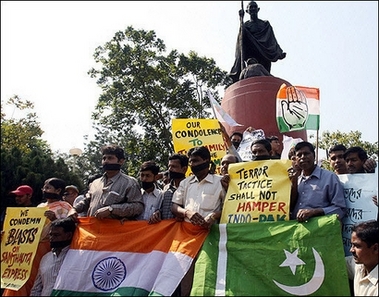Asia-Pacific
India, Pakistan reaffirm peace vows after train attack
(AFP)
Updated: 2007-02-21 19:37
 |
Large Medium Small |
NEW DELHI - India and Pakistan vowed on Wednesday to stay committed to their peace process despite attempts to derail it and agreed to cooperate in investigating the bombing of a cross-border train that killed 68 people.
 Indian Congress Party activists take part in a condolence gathering in Kolkata. India questioned a suspect and launched a manhunt for two more about blasts that killed 68 on a trans-border train as peace talks with Islamabad went ahead amid high security for all Pakistan-bound transport. [AFP] |
Foreign ministers of the two countries, who met days after the attack on the train from Delhi to the Pakistani city of Lahore, also signed an accord to reduce risks of accidents linked to their nuclear arsenals.
Analysts said the fact the two leaders met and signed the agreement despite the blasts was a departure from the past -- when they have often indulged in mutual fingerpointing and acrimony -- and signalled a new diplomatic maturity.
Otherwise, there was little progress in resolving the disputes that have plagued relations between the historic rivals.
"The holding of the ... meeting as scheduled is a reaffirmation of the commitment of both India and Pakistan to the dialogue process," Indian Foreign Minister Pranab Mukherjee told a joint news conference.
New Delhi would share leads from its investigations into the bombings with Islamabad when a joint panel set up to fight terrorism holds its first meeting in the Pakistani capital next month, he said.
His Pakistani counterpart, Khursheed Mehmood Kasuri, reiterated that the attack on the train highlighted the need for the two countries to work more closely.
"TALKS ON TRACK"
"I am sure that when the ... terror mechanism meets in Islamabad this will be a very high item on their agenda," Kasuri said referring to the investigations.
"We need the railway authorities also to interact with each other, to learn from this experience and prevent a tragedy of this nature occurring," Kasuri added.
Wednesday's talks were originally scheduled to focus on improving trust and pushing the slow-moving peace process before the agenda was hijacked by the Sunday midnight blasts on the Samjhauta Express.
Although early investigations have yielded no breakthrough and New Delhi has refrained from blaming Pakistan, suspicion has again fallen on Muslim extremists opposed to peace between the neighbours.
The long-time South Asian rivals launched peace talks three years ago after coming close to the brink of what would have been their fourth war.
While the peace process has yet to achieve a breakthrough on the central dispute over Kashmir, it has improved relations and the Samjhauta train was a symbol of that thaw.
Last year India briefly suspended talks after 186 people were killed in a series of bomb blasts on commuter trains in the country's financial capital, Mumbai.
But the neighbours were becoming aware that such freezes were counter-productive, analysts said.
"Both governments are now realising that unless they go ahead and keep the talks going, the terrorists will get an upper hand," said Talat Masood, an analyst and retired Pakistani army general.
"That's why they will try to keep the talks on track."
| 分享按钮 |